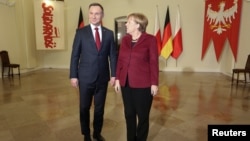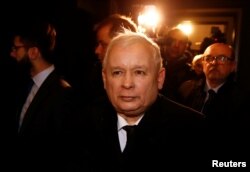German Chancellor Angela Merkel appeared on Tuesday to win promises of closer cooperation from Poland's eurosceptic rulers, during a visit to Warsaw to discuss reforms essential for the European Union to tackle mounting divisions over its future.
Europe's most powerful leader needs the backing of Poland, wary of any increased powers for Brussels, to agree reforms in March, on the 60th anniversary of the founding Rome Treaty. In the same month, Britain plans to give notice of leaving.
Governed by the conservative Law and Justice (PiS) party, Poland is lobbying for an overhaul of the EU's fundamental rulebook, its treaty, to return some power to member states.
But diplomats say the PiS, feeling increasingly isolated in Europe since Britain — a strategic ally — decided to leave, may be seeking to improve its once-frosty ties with Berlin.
A rare meeting
Merkel held a rare meeting with PiS leader Jaroslaw Kaczynski, a politician deeply distrustful of Germany, who once said the chancellor's goal was to make Poland subordinate to its western neighbor.
“There was a good atmosphere,” Kaczynski told reporters after the 60-minute talk with Merkel in a five-star hotel in central Warsaw.
“My sense is that today's visit will bring good results,” he said, in comments contrasting with his previous accusations that Germany sought to wield too much influence in Poland.
Relations between Poland, the EU's sixth biggest nation, and Germany, Poland's main trade partner, cooled when the PiS was last in power in 2005-07.
Kaczynski, then prime minister, had once invoked the number of Poles killed by the Nazis in World War II to justify demands for greater voting power within the EU in 2007.
He wields no government posts now but is seen as the main powerbroker in Poland.
Changing mood
German diplomats described Merkel's meeting with Kaczynski as “friendly and open,” although Merkel herself warned Warsaw that its ambitions to curb the power of Brussels institutions were unrealistic.
“There may ... be some ideas that go in the direction of treaty change. I will put forward the argument that we should proceed very cautiously,” she told a joint news conference with Prime Minister Beata Szydlo.
Szydlo said Poland was determined to deepen cooperation with Germany.
“Poland and Germany ... have a huge role to play in the changes that are taking place in the Union,” she said.
Merkel also issued veiled criticism of the Polish government's democratic record, which critics say represent a tilt towards authoritarianism and which is the subject of a row between Warsaw and the European Commission.
EU has questions for Law and Justice party
Merkel — who grew up in communist East Germany — said she was pleased her government planned to address EU questions on the issue later this month.
“As a young person, I always looked closely at what was happening in Poland... Without Solidarity, European unification, the end of the Cold War would not have come so quickly,” she said, referring to the Polish trade union movement that contributed to the overthrow of communist rule in 1989. “Since then we know how important plurality in a society is, how important an independent judicial system is, independent media.”
The European Commission has questioned the ruling Law and Justice (PIS) party's efforts to gain more control over state institutions, including public media and the constitutional court.
Britain's decision to quit the EU means Poland is losing a strategic ally in defense policy and in its push for a tough EU line on Russia, at a time when the election of Donald Trump as U.S. president is raising questions over the West's approach to Moscow.









